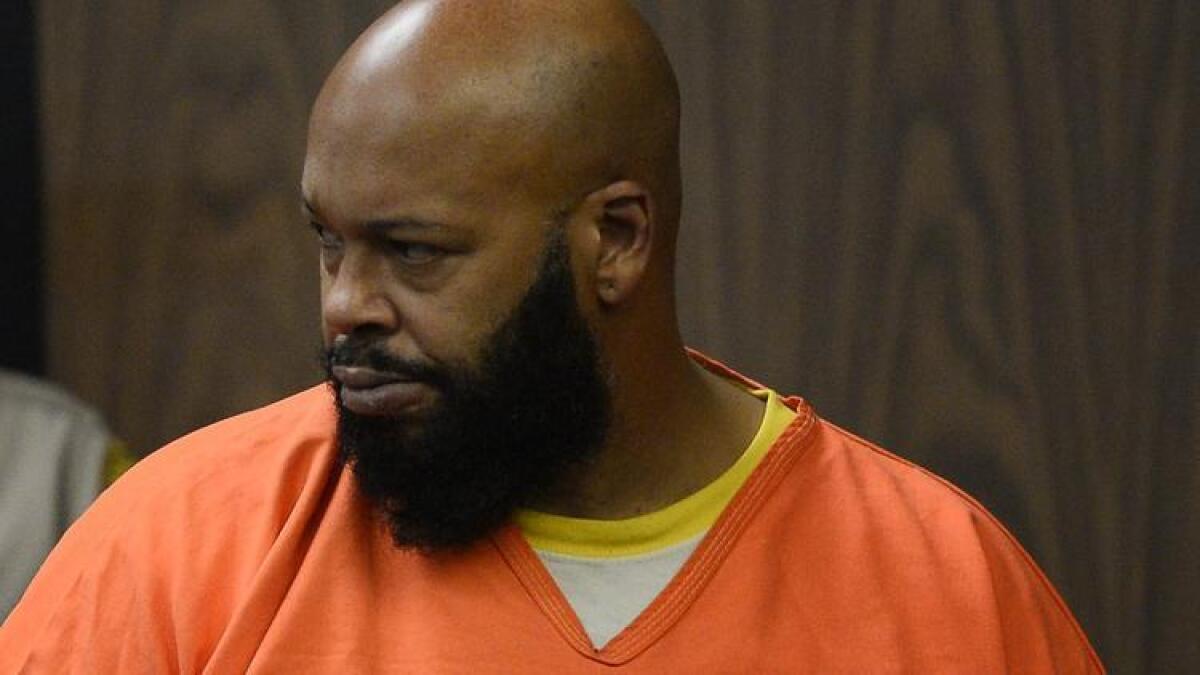Op-Ed: ‘Suge’ Knight and the lurid legacy of gangsta rap

- Share via
When I read about former rap mogul Marion “Suge” Knight’s latest brush with the law — charges of vehicular assault that killed one man and wounded another — I was appalled but unsurprised. Knight has been in the spotlight in this sort of way for years. At 49, he’s still a bad-boy figure whose life has long imitated the mean-street art of gangsta rap that he helped to cultivate in his hometown of Compton in the early ‘90s. He creates drama.
The second thing I felt was almost opposite: a familiar angst that a black public figure/celebrity had been charged with something that would reflect badly on all black people. I don’t know Knight, but it doesn’t matter: His murder charges had me once again staggering under the burden of representation.
This burden has been with black people a long time, as long as there’s been racial injustice reflected by media that deliberately render black people as savages and subhumans. Maybe those renderings are less deliberate these days — sometimes it’s just news reporting sorry facts — but because we’re still living with injustice, the black criminal narrative still has the power to oppress. So when someone of note does something that evokes that narrative, we cringe.
Knight is especially cringe-worthy because his notability is built on the kinds of black images that to many black people are part of the problem. And those images aren’t limited to Compton; they apply to any black neighborhood — Inglewood, South Central, even Ladera Heights. It’s telling that a scene involving Knight’s character in the upcoming N.W.A biopic “Straight Outta Compton” was shot not in Compton but in very middle-class Leimert Park. That scene might have been true to life, but a merchant I know in Leimert wrung his hands about an association he knows many people will make — that Leimert Park is Compton. It’s never the other way around.
Some people say the good news is that Knight doesn’t carry nearly the cultural weight he used to. James Braxton Peterson, of the Guardian newspaper, said the latest imbroglio only points to how hip-hop, at least, has moved past the whole gangsta rap aesthetic to something more sophisticated and literate; N.W.A has given way to Macklemore and Drake. The reflective stylings of Kendrick Lamar, currently Compton’s best-known rapper, are a far cry from the scowls and growling delivery of Ice Cube and crew.
But I disagree about the moving on. Maybe N.W.A and its gold-chain-wearing ilk are no longer king, but the more lurid legacy of gangsta rap, including the profligate use of the N-word and the glorification of a certain kind of black life in the ‘hood, is very much alive. Such sentiments have become so embedded in modern hip-hop that they simply don’t raise eyebrows anymore.
Not long ago I wrote about being in a trendy boutique in Larchmont Village and feeling assaulted by the obscenity-laced hip-hop that played as atmosphere music. No one seemed to take any notice of it but me. And I usually don’t notice it, which is exactly what startled me when the lyrics — delivered in a monotone that was almost soothing — broke through my consciousness. In the last 20 years, “nigga” and “bitch” have gone from being in your face to background noise, suitable Muzak even in overwhelmingly white places like Larchmont. This kind of racial progress I can do without.
Similarly, what Knight represents has not gone away. The black archetypes that he freely embodied and from which he profited so handsomely — thug, hustler, criminal, materialist, all-around dangerous fellow — still hold sway not just in popular culture but in politics. The elephant in the room in all the arguments against taxing the 1% to help the rest of us, and in the arguments for law and order, is still the predatory, almost pathological Negro who is the eternal outsider and deserves to be.
In the age of Obama, which is touted as being racially enlightened, blacks must still fight that perception; they have to disprove the negative, even Obama himself. Knight’s history of criminal entanglements reinforces what I call the essentialist view of black people, especially black men: No matter how much success they achieve, their true nature doesn’t change. You can take the man out of Compton, et cetera.
As for “Straight Outta Compton,” due out this summer, I’m uneasy. It might be brilliant, but so far it’s garnered attention mostly for a controversial casting call issued last year that ranked aspiring female extras by skin color and hair texture — “A” girls were required to be slim Beyonce types, “D” girls dark and heavyset. That crude continuum of black folks is Hollywood for sure, but it’s often our view as well. Knight may be finished, but in the public’s racial imagination, alas, he’s still a star.
Erin Aubry Kaplan is a contributing writer to Opinion. Her second book, “I Heart Obama,” is scheduled to be published in 2016.
Follow the Opinion section on Twitter @latimesopinion and Facebook
More to Read
A cure for the common opinion
Get thought-provoking perspectives with our weekly newsletter.
You may occasionally receive promotional content from the Los Angeles Times.









